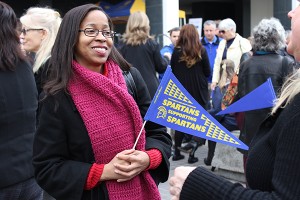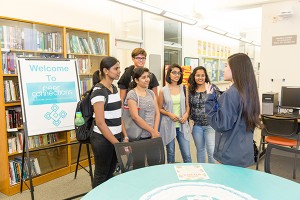
Photo: Christina Olivas
San Jose State University staff and faculty gave more than $80,000 in donations to the Spartan Supporting Spartans Campaign in 2016. The 2017 campaign will launch in March.
In 2016, the Spartans Supporting Spartans Annual Giving Campaign raised $81,700 in gifts and pledges from 287 faculty and staff at SJSU. The annual fundraising campaign raises money that directly supports students through scholarships, the student emergency fund, and expanding research, scholarship and creative activity opportunities for them to engage with faculty.
The Spartans Supporting Spartans Campaign Committee has already started preparations for the spring 2017 donation drive that is anticipated to kick off onMarch 2. The committee is again planning to bring mobile coffee carts to more than half a dozen locations on campus in March and April, with hot beverages, treats and donation forms in hand. The co-chairs this year include Michael Kimbarow, the chair of the Academic Senate and a professor of Communicative Disorders and Sciences, and Elisabeth Thomas, an outreach librarian.
“I received my bachelor’s and master’s degrees,” she said, “And have made a career here at SJSU. I continue to make great memories full of wonderful people, places and events.”
Thomas joined the committee in spring 2013 and became co-chair in spring 2015. She gives back as part of the Spartans Supporting Spartans campaign because it feels good to give back “to a place that has given me so much.”
“These donations will help give current and future SJSU students the resources they need for academic success so that they too will one day look on the good memories they made at SJSU,” she said.
Kimbarow is serving for the third year as co-chair and he donates because he believes every dollar raised to support students and the mission is a dollar well spent. He donates to his department to support its mission of providing speech and language assessment and treatment to individuals with communicative disorders.
“It’s my way of showing potential donors that I’m not asking them to do anything that I’m not willing to do myself to support SJSU,” he said. “In my opinion, the best reason for faculty and staff to give to the campaign is that it feels good to know that in some small way we are making a positive impact and statement to the campus about our students and programs.”
Faculty and staff may designate their donation to any fund on campus, including one within their own department, college or division. Popular funds in recent years have included SJSU’s General Scholarship Fund, the Support Our Staff Scholarship Fund (a scholarship for SJSU employees who are completing a degree), and the Research, Scholarship and Creative Activity fund.


